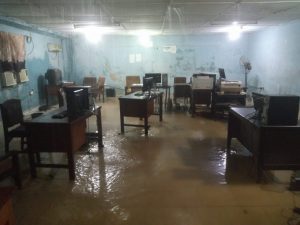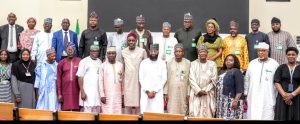Nigeria’s Education Budget, far Off 25% UNESCO Benchmark

The amount provisioned for the Federal Ministry of Education and its agencies was 8.20 percent of 2023 budget, and that is far off 25 percent recommended by the United Nations Educational, Scientific, and Cultural Organization (UNESCO).
A government that fails to give its people quality education should prepare itself for an existential crisis.
It is glaring that the country’s education needs an overhaul as it is grossly underfunded, and the deteriorating infrastructure in schools at all levels across the country and agitation by University lecturers over poor condition of service is regrettable.
In the last four decades, there has been tumultuous uproar by the civil society over the underfunding of public schools and the government is nonchalant about a sector that is pivotal to economic growth.
In some states, pupils take lessons under the trees as there are no classes available and in public schools students are cramped in classrooms as there are dearth of benches and chairs.
Because of these flagging conditions, many parents enroll their children in private schools where teachers are well paid and the environment is benign for learning.
“In the whole country, there were 100.4 thousand public classrooms for pre-primary education, whereas the classrooms required were over 146 thousand, which means that there was a lack in terms of classrooms in Nigeria,” said Doris Dokua Sasu, Research Expert covering primarily society and agricultural topics for Africa, particularly Ghana and Nigeria.
Experts say the economy with social factors combined with insecurity have hindered the federal government from giving children quality education in Nigeria.
Of course, the recession of 2016 brought on by a precipitous drop in crude oil price and the coronavirus pandemic have weakened the purchasing power of consumers, magnifying the number of poor people.
According to the 2018 Nigeria Living Standards Survey, 46.4% of Nigerians are poor and 53% of families are living on less than US$1.90 a day.
It is important to note that the country’s fast growing population that crave for consumption means infrastructure is stretched, as many people scramble for the little resources available, which probably explains overcrowding in schools.
“Over the past decade the school age population has increased by 23 million increasing pressure on the government to meet education resource needs, especially running costs for institutions, supply of teachers/instructors among other needs,” said a report by UNESCO.
It is indisputable that parents in the North, where poor households make up 80 percent of the population in the region, are struggling to pay school fees.
That is why the North has the highest number of out of school children and illiterate in the country, and the insecurity in the region buoyed by attacks by insurgents and bandits have aggravated the pains of parents who are despondent.
“Repeated attacks on schools and universities as well as on teachers and students by Boko Haram have undermined the entire education system. It is estimated that more than 1,400 schools have been destroyed, damaged or looted primarily in the northeast and more than 600,000 children have lost access to education,” said a report by UNESCO.
“As a result of the ongoing insecurity in the region, nearly 300 school girls from a boarding school in Zamfara state were kidnapped in February 2021. They were later released unharmed but the event throws into sharp focus the need to guarantee the security of school children and their teachers and prevent the destruction of infrastructure, so that parents will feel it is safe to send their children to class,” said UNESCO.
University lectures have been embarking on strike over poor condition of service and the decrepit infrastructure on campuses.
Last year, lecturers embarked on an eight months strike that disrupted the school calendar








